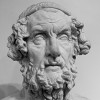“ Shame is not of his soul; nor understood, The greatest evil and the greatest good. Still for one loss he rages unresign’d, Repugnant to the lot of all mankind; To lose a friend, a brother, or a son, Heaven dooms each mortal, and its will is done: Awhile they sorrow, then dismiss their care; Fate gives the wound, and man is born to bear. ”
Homer, Iliad (c. 850 BC). copy citation
| Author | Homer |
|---|---|
| Source | Iliad |
| Topic | loss evil |
| Date | c. 850 BC |
| Language | English |
| Reference | |
| Note | Translated by Alexander Pope |
| Weblink | http://www.gutenberg.org/files/6130/6130-h/6130-h.htm |
Context
“That iron heart, inflexibly severe; A lion, not a man, who slaughters wide, In strength of rage, and impotence of pride; Who hastes to murder with a savage joy, Invades around, and breathes but to destroy! Shame is not of his soul; nor understood, The greatest evil and the greatest good. Still for one loss he rages unresign’d, Repugnant to the lot of all mankind; To lose a friend, a brother, or a son, Heaven dooms each mortal, and its will is done: Awhile they sorrow, then dismiss their care; Fate gives the wound, and man is born to bear. But this insatiate, the commission given By fate exceeds, and tempts the wrath of heaven: Lo, how his rage dishonest drags along Hector’s dead earth, insensible of wrong! Brave though he be, yet by no reason awed, He violates the laws of man and god.””
source



